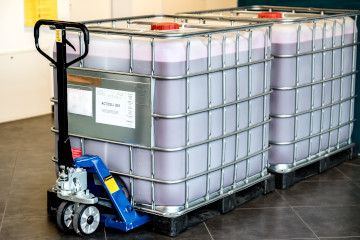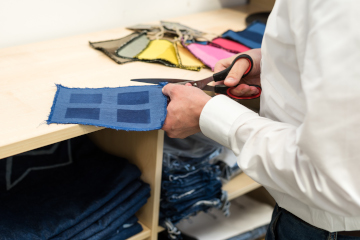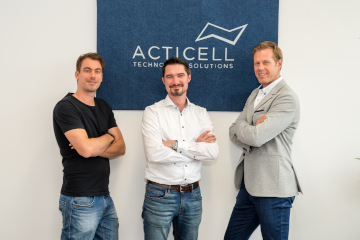From university lab to business
In the 2000s, the biotechnologist Christian Schimper researched enzyme solutions at the University of Innsbruck when an industry-derived problem inspired him to create an alternative solution for the embroidery production business. Industrial embroideries are generally produced by stitching textile threads on a textile basis covered by a second layer of interim textile ground. After stitching, this interim base needs to be tendered, through the application of harmful chemicals, such as sulfuric acids for example, and then removed. Christian and his university-based research team under the guidance of Prof. Bechtold found that, if one modified the structure of cellulose and applied enzymes instead, the use of sulfuric acid could be avoided. With this answer at hand, the team started investigating further possible application fields for their innovation, including the treatment of denim fabric. They found that denim bleaching, which represents a much larger market than the embroideries sector, also worked perfectly well with this new technology, and the team applied for a patent. Then, in 2011, Christian became active in the Viennese start-up scene and went from lab to market with his solution by creating a product and commercialising it. Obtaining his first pre-seed funding allowed the team to found Acticell in 2014.
Eliminating toxic substances/elements from denim bleaching industry
As explained above, Acticell’s first innovation was an enzyme booster that changes the pore diameter of cellulose to help create unique effects, such as the famous used look, on jeans by allowing enzymes and removing a distinct portion of textile surfaces. It also helped to boost colour intensity by up to 25%.However, Acticell soon realised that the enzyme booster alone does not help create any of the bleaching effects that denim customers are demanding today. This led Christian and his team to their second innovation: A polymer-based and laser-activated chemical bleaching solution. Laser technology is currently among the most popular methods to create a used look on denim clothing by burning away textile surfaces and evaporating indigo dyestuff. After evaporation, this sustainable approach for bleaching laser-treated surfaces often requires the application of the very unsustainable potassium permanganate, which includes harmful heavy metals and is considered toxic for workers and even dangerous for the unborn child.So, in order to completely avoid its application during bleaching, Acticell designed a heat-activated chemical that creates intense bleaching effects wherever the laser hits pre-treated textile surfaces. With this method, less energy is used for bleaching, laser application time is considerably lower, and production cycles are shorter. Beyond this, the reduced heat application also bears completely new possibilities: Even materials that have a high proportion of synthetic fibres, such as polyester and elastane can be used to create effects that were widely only possible with cotton before. In their newest research, the start-up is replacing chlorine bleach with a newly invented and so far very efficient ozone booster, which is applied in a closed cycle and turned back into water leaving no hazardous compounds behind. If Acticell manages to further optimise dye cast results for this technology, treated garments would need to be washed only once, as opposed to usually 7-9 times with conventional chlorine bleach, allowing for a reduced water consumption, energy usage, washing time, number of washing circles and washing temperatures.
Setting the path for a more sustainable textile industry
Since its foundation, all Acticell facilities, including large scale production, are based in Vienna, Austria.Numerous international textile industry clients and distributors are already selling Acticell’s products under their own brand. When Covid-19 first hit Asia, activities within the textile market almost came down to working at a 30% capacity. But the market is slowly taking up pace again, with big brands, such as Levi’s, the biggest single brand for denim products, restarting to redesign their industrial processes in a more sustainable manner while benefitting from Global Organic Textile Standard (GOTS) certified suppliers, such as Acticell. And Acticell has more promising ideas in the pipeline: the start-up partnered up with the University of Natural Resources, Vienna, and the University of Applied Sciences in Krems, Austria, to further research on the application of safer chemicals within the textile industries, which might lead to further patents and great sustainable solutions. Thanks to its chemical innovations, Acticell is actively contributing to the SDG 6 (clean water & sanitation), SDG 9 (industry, innovation & infrastructure), SDG 12 (responsible consumption & production), and SDG 13 (climate action). Acticell was on-boarded to the ISC3 Global Start-up Service in August 2019.




